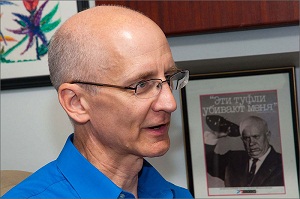Military to increase solar energy use in Afghanistan
 Dependence on fossil fuels is costly. But it’s also deadly in Afghanistan and Iraq, where insurgent attacks on refueling convoys accounted for 10-12 percent of military deaths in 2009, according to a report from the Army Environmental Policy Institute.
Dependence on fossil fuels is costly. But it’s also deadly in Afghanistan and Iraq, where insurgent attacks on refueling convoys accounted for 10-12 percent of military deaths in 2009, according to a report from the Army Environmental Policy Institute.
At the request of Marine Corps leadership, Dr. John Barnett with the Deployment and Industry Partnerships division of NREL visited several military bases in Afghanistan in September 2009. Part of a Marine Corps team, his mission was to reduce the amount of fuel consumption and lessen the need for dangerous and deadly convoy missions.
One of his recommendations was to use the sun.
“Afghanistan has a lot of sun,” said Barnett. “Depending on the size of the base and duration of occupation, the potential is there for larger solar arrays. On smaller bases, where energy demands are lower, we could replace almost all fuel requirements with solar energy to minimize the transportation of fuel to out-of-the-way places that present the most danger.”
Barnett’s Afghanistan team focused on energy efficiency analysis and evaluation of the potential for use of renewable technologies in the field. He noted that several solar applications, such as solar water pumps, solar water purification, solar cold storage, solar water heaters, solar chargers, and even solar ovens could meet the energy needs of troops for hot, cold, and clean water, communications, lighting, and food preparation.
“The diversity of solar applications makes solar energy particularly useful in theater,” said Barnett.
A year after Barnett’s recommendations in Afghanistan, the military has begun implementing solar power in the field.
According to the New York Times, 150 Marines recently became the first to use solar technology in the field in lieu of diesel and kerosene. Solar packs complete with collapsible solar panels, solar tent shields that provide both energy and shade, energy conserving lights, and solar chargers that will power computers and other electronic devices have been given to each Marine to lessen refueling needs.
“Marine Corps General Conway is an outspoken advocate for the use of clean and renewable energy,” said Barnett. “It’s not an overnight process, but great strides are being made (in the Defense Department) to identify ways to both minimize energy use and maximize renewables.”
Pictured: NREL engineer Dr. John Barnett discusses his trip to Afghanistan, where he made several recommendations to improve expeditionary self-sufficiency. Photo: Pat Corkery



